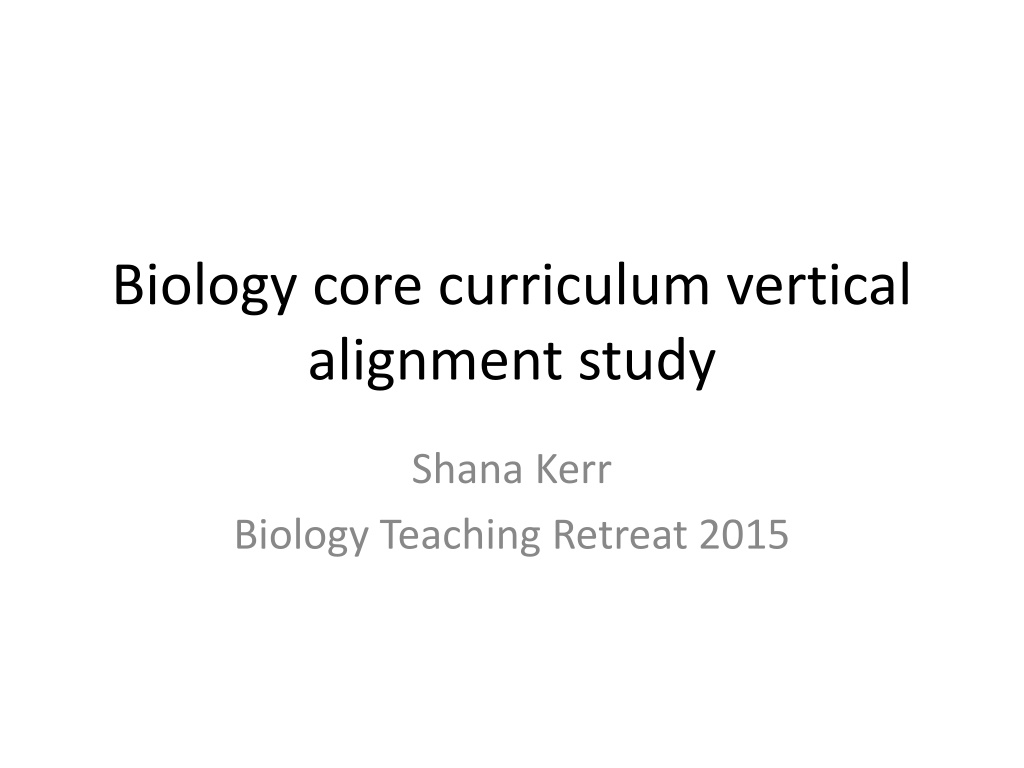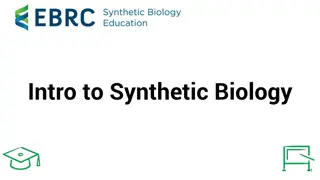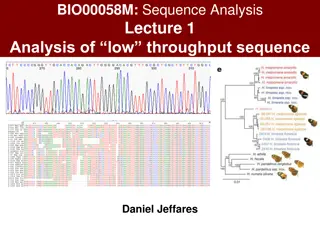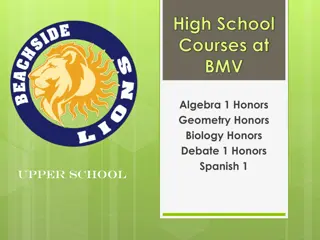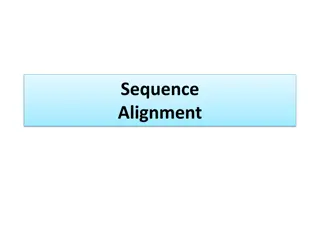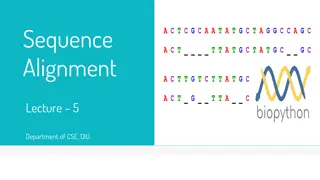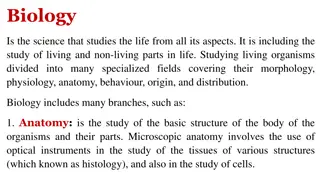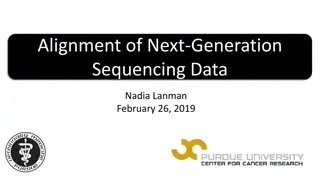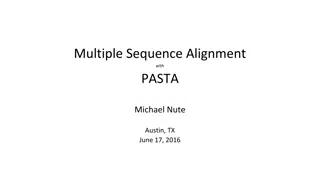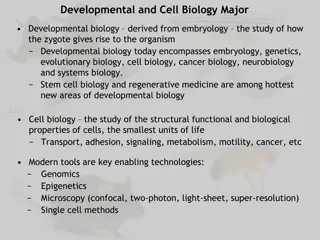Enhancing Alignment Between Introductory Biology and Core Courses
Explore the alignment of the Biology core curriculum, focusing on the structure, goals, and rationale behind flipping portions of the curriculum. Evaluate the preparedness of students for core courses, identify gaps, redundancies, and essential knowledge transfer. Study design involves categorizing topics for importance and gathering feedback from core course instructors.
Download Presentation

Please find below an Image/Link to download the presentation.
The content on the website is provided AS IS for your information and personal use only. It may not be sold, licensed, or shared on other websites without obtaining consent from the author. Download presentation by click this link. If you encounter any issues during the download, it is possible that the publisher has removed the file from their server.
E N D
Presentation Transcript
Biology core curriculum vertical alignment study Shana Kerr Biology Teaching Retreat 2015
Goals of this session Rationale, goals, and study approach Broad overview of findings and implications Detailed discussion/next steps
Biology Core Curriculum Structure Biol 1510/1511 modules: Biomolecules Evolution Ecology Genetics 2000-Level Core Courses: Ecology Genetics 3000-Level Core Courses: Evolutionary Biology Cell & Molecular Biology
Rationale Wanted to flip portions of 1510/1511 1510/1511 is the required course for all upper level Biology courses But there is little overlap between 1510/1511 and core course instructors Intro bio committee developed 1510/1511 learning objectives for every lecture students will be able to Opportunity to generate discussion about our curriculum on a program level
How well aligned is the 1510/1511 curriculum with the four core courses? What LOs are most important as incoming knowledge for core courses? Are students prepared for core courses? Are there redundancies and/or gaps between 1510/1511 and core courses? Are there redundancies and/or gaps between courses on a program level?
Study Design Phase I Content/topics of each core course categorized for relative importance (Wiggins & McTighe) by at least three instructors the course Phase II Introductory Biology Learning Objectives categorized by at least two core course instructors for relative importance for preparation for their course Phase III Open-ended follow-up and discussion with core course instructors via one- on-one interviews Top three concepts/topics for which students are least prepared identified by core course instructors 1: Worth being familiar with/ Nice to know 2: Important to know and be able to do 3: Enduring understanding/ Essential knowledge Adapted from Wiggins & McTighe , Understanding by Design, 1998
Study prompts Core Course Topics: The following topics/concepts were identified from recent course syllabi. Based on the way you and your co-instructors teach the course, and thinking about what you want students to retain 6 months to a year after the course is over, please categorize each topic/concept according to the following scale: 0 = Not important / Not taught 1 = Worth being familiar with / Nice for students to know 2 = Important for students to know and/or be able to do 3 = "Enduring" understanding / Essential knowledge for biologists Topic or Concept: Mitosis Meiosis DNA as hereditary material Dominant/recessive alleles
Average categorization for core course topics as outgoing knowledge 3.50 Average topic rating as outgoing 3.00 2.50 knowledge 2.00 1.50 1.00 0.50 0.00 Genetics Ecology Cell & Molecular Evolution Core Course 0 = Not important / Not taught 1 = Worth being familiar with / Nice for students to know 2 = Important for students to know and/or be able to do 3 = "Enduring" understanding / Essential knowledge for biologists Error bars represent standard deviation
Study prompts 1510/1511 Learning Objectives: The following Learning Objectives are used to design lectures for each module in Biology 1510. Please categorize these Learning Objectives for their importance to your course as incoming student knowledge according to the following scale: 0 = Not important / Not relevant as incoming knowledge 1 = Worth being familiar with / Nice to know as incoming knowledge 2 = Important for students to know and/or be able to do as incoming knowledge 3 = Enduring understanding / Essential as incoming knowledge Learning Objective ( students will be able to ) Describe the chromosomal makeup of a cell using the terms chromosome, sister chromatid, homologous chromosome, diploid, haploid, and tetrad Explain how chromosomal separation at meiosis leads to segregation of alleles in gametes Explain how alignment at metaphase results in independent assortment of (unlinked) genes
Incoming knowledge expectations for each core course: analysis by core course 3.50 3.00 Average 1510/1511 module LO rating 2.50 2.00 Evolution Module Ecology Module 1.50 Biomolecules Module 1.00 Genetics Module 0.50 0.00 Genetics Course Ecology Course Cell Course* Evolution Course -0.50 Core Course *one faculty evaluated LOs for Evolution & Ecology modules; two faculty evaluated LOs for Biomolecules & Genetics modules. Error bars represent standard deviation.
Incoming knowledge expectations for each core course: analysis by 1510/1511 module 3.50 3.00 Average 1510/1511 module LO rating 2.50 2.00 Genetics Course Ecology Course 1.50 Cell Course* 1.00 Evolution Course 0.50 0.00 Evolution Module Ecology Module Biomolecules Module Genetics Module -0.50 1510/1511 Module *one faculty evaluated LOs for Evolution & Ecology modules; two faculty evaluated LOs for Biomolecules & Genetics modules. Error bars represent standard deviation.
How do 1510/1511 LOs align with core course topics?
Total Number of 1510/1511 LOs and Core Course Topics 60 50 40 # LOs/Topics 30 1510/1511 20 Core Course 10 0 Evolution Ecology* Biomolecules/Cell & Molecular Genetics 1510/1511 Module or Core Course *Ecology LOs were in draft form at the time of this study
Analysis approach for alignment of individual LOs with individual topics: Core Course Topic/Concept: Topic A Topic B Topic C Topic D Avg LO/Topic rating by core course faculty # Topics related to LO 1.00 2.00 3.00 3.00 1510 Learning Objective: LO 1 4 1.00 X X X X LO 2 1 2.00 X LO 3 1 3.00 X LO 4 4 3.00 X X X x
Percent of 1510/1511 module LOs linked to at least one core course topic 120.00 Percent of module LOs linked to core course topics 100.00 photosynthesis 80.00 Evolution Module (29 LOs) 60.00 Ecology Module (23 LOs) Biomolecules Module (54 LOS) 40.00 Genetics Module (36 LOs) 20.00 0.00 Genetics Course Ecology Course Cell Course Evolution Course Core Course
Average number of topic links per LO 16.00 14.00 Average number of topic links per LO 12.00 10.00 Evolution Module 8.00 Ecology Module 6.00 Biomolecules Module Genetics Module 4.00 2.00 0.00 Genetics Course Ecology Course Cell Course Evolution Course -2.00 Core Course Error bars represent standard deviation.
Incoming knowledge gaps Genetics Mitosis/meiosis: behavior of chromosomes Interpreting phylogenetic trees Importance of genetics in evolution/vice versa Probability in Mendelian genetics Ecology: How to analyze organismal interactions in a quantitative way Conceptual definition of ecology; recognition that ecology is a process Importance of ecology in evolution/vice versa Cell & Molecular Highly variable student backgrounds Practical understanding of genetic concepts incl. allele, transcriptional regulation Evolution Interpreting phylogenetic trees HWE (but do they need it?) History of life: focus should be on process/amount of time rather than specific timeline of events Speciation and species concepts All: how to study, how to analyze/solve problems vs. memorizing facts, process of science
General curricular concerns Redundancy between intro/core and across core courses: is it good or bad? How to make evolution more explicit in each core (all areas of biology are sub-disciplines of evolution) History of science vs process of science: should we move away from classical/historical studies and focus instead on how science is done ( evaluate experiments, not learn history )? Overall amount of material ( why cover everything if they re not going to keep it? ) How much variation is there in core course core based on instructor, and is this OK? Learning objectives for core courses
Take-homes and remaining questions In general we have good alignment between 151x and the core courses There is a lot of overlap/redundancy esp. between Genetics and Cell & Molecular this is viewed as both good and bad There are missed opportunities to make evolution more explicit in the core courses (esp. in Genetics and Ecology) There are specific incoming knowledge gaps in each core course which can be addressed in 1510 Are we asking students to be more broadly trained than we consider ourselves to be?
Limitations LOs/topics evaluated by only 3 faculty (max) Did not ask faculty to assess each LO or topic for general preparation level (assess lack of incoming knowledge) Evaluated by one faculty for links between 151x LOs/core course topics Comparison between LOs (measurable) vs topics (descriptive)
Analysis approach for alignment of individual LOs with individual topics: heat map of topic score/LO score Core Course Topic/Concept: Topic A Topic B Topic C Topic D Avg LO/Topic rating by core course faculty # Topics related to LO 1.00 2.00 3.00 3.00 1510 Learning Objective: LO 1 4 1.00 1.00 2.00 3.00 3.00 LO 2 1 2.00 1.00 LO 3 1 3.00 0.33 LO 4 4 3.00 0.33 0.67 1.00 1.00
Review the data: http://tinyurl.com/biovertical What necessary 1510/1511 LOs are students not adequately meeting prior to the core course? Are there inappropriate gaps and/or redundancies between LOs and core course topics?
